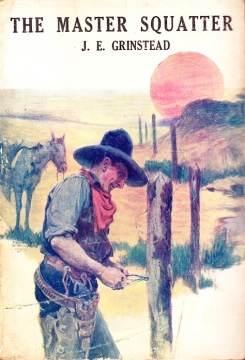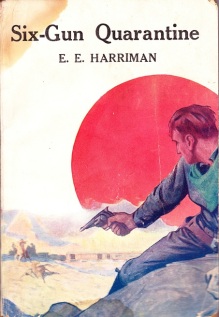
Book 76 is “The Master Squatter” by J. E. Grinstead.
The story originates in the November 1925 edition of the pulp, Frontier.
Officially, this book is # 76, however, the publishers, Garden City Publishing (Doubleday & Co.), decided to alter the spine numbering to # 13, reflecting the fact that the prior dozen were part of “The New Western Series” (as advertising on the back cover). This book was released 1st February 1927.
(NOTE: All of the books in this “New Western Series” were released monthly)
The first in this proposed series was E. E. Harriman’s “Texas Men and Texas Cattle” which I blogged about, weeks ago.
The tale opens with the Mitchell family moving out to Texas, for the health of Lon’s mother, during the years of the fence-cutting wars. Barbed wire is a fairly recent invention up to this point, and the Mitchell family find themselves walled in by miles of wire. One day, Lon’s father is slain by squatter Jim Sampson. The consumptive mother runs out of the cabin, spots her slain husband, froths at the mouth, and promptly dies. Lon, blond and blue-eyed, barely 15-years of age, cries his eyes out and on that fateful day, youthful innocence is shattered. On the outside, he becomes a shell; inside, he is seething with murderous, vengeful intent. He eventually makes his way to some neighbors, whom take him in and teach him the ways of the gun. It’s not long before he is proficient, with both eyes open, and capable with either hand. A sure dead-shot and damn quick on the draw.
Fast-forward 7 years. Murderer Jim Sampson is no longer in Texas. He has migrated up to the Chickasaw reservation some years back, and, with two outlaws, secured half a million acres of land over the years. All that was required, initially, was his two sidekicks to marry a squaw. Within a year, the women were mysteriously dead but they had lived long enough for the villains to be accepted on the territory.
Not content with his reach, Sampson, the master squatter, seeks to freely obtain [illegally] more land, by slapping down posts and fencing in the obtained property. However, his neighbor has other ideas. He is preparing to go to war with Sampson, to preserve his lands.
Enter Lon, seven years older. He is riding with a bunch of cowmen pushing 7000 head north through the Chickasaw trail, when they come to a stop outside of a town. Lon and a small crew go into town and unexpectedly find themselves in the middle of a proposed murder plot. Lon drops both assassins before they have a chance to slap leather, stunning all occupants.
Turns out the pair due to be slain are the aforementioned owners of the competing ranch. With their assistance, they move all 7000 cows safely through the reservation, as a debt for Lon’s slaying of the assassins.
With that mission complete, Lon breaks company with the crew and joins up with the rancher, since he now knows that Jim Sampson’s residence is here. Riding onto the ranch one day with a marshal, he and Lon await the arrival of Sampson from his ride into town.
Sampson curses vilely when he spots Lon, and goes for his iron, but, unfortunately (for him, of course), he was both neither quick enough nor smart enough to wait for a better opportunity. Dying in minutes, he curses the boy before the marshal, whom later asks Lon to explain how the two know each other.
Lon, for the first time in seven years, spills the beans, and expects to be arrested for murder. However, the marshal negates this, stating that Lon had been deputized, and Sampson had been reaching for his death-dealer. The slate is clean.
Lon rides away, with no mission left in life, back to the neighboring ranch, where there is a cute 18-year old innocent-looking girl, waiting for him…
At its heart, the novel is quite simple, forthright, and engagingly fun to read. However, like so many other authors, Grinstead inserts some of his own religious philosophies and propaganda into the novel, for literally SEVERAL pages. Personally, I detest this, as it detracts from the story, but I do understand that young men are reading this story (back then) and Grinstead (or the editors) may have wanted to make sure the readers understood that you are held accountable for your own actions, whether it be your belief in God, or, the judicial system, or vigilantism, etc.


